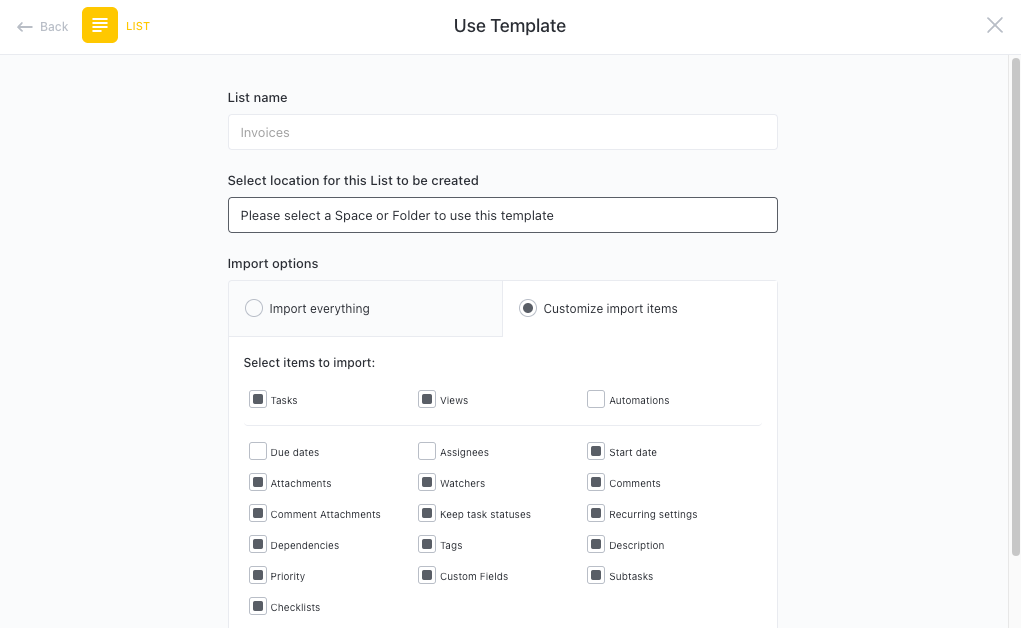As a logistics team leader, you know the importance of running efficient and productive team meetings. But with so many moving parts in the logistics world, it can be challenging to keep everyone on the same page. That's where ClickUp's Logistics Teams Meeting Agenda Template comes in handy!
With this template, you can:
- Plan and organize your logistics team meetings with ease
- Discuss critical topics such as project updates, KPIs, and resource allocation
- Address challenges or issues that require immediate attention
- Foster better communication, coordination, and productivity within your logistics department
Don't let your team meetings become chaotic and unproductive. Try ClickUp's Logistics Teams Meeting Agenda Template today and streamline your logistics operations like never before!
Benefits of Logistics Teams Meeting Agenda Template
Logistics team leaders or managers can streamline their meetings and ensure effective communication with the Logistics Teams Meeting Agenda Template. This template offers the following benefits:
- Efficient planning and organization of logistics team meetings
- Clear structure and agenda to keep discussions focused and on track
- Easy tracking of project updates, key performance indicators, and resource allocation
- Improved coordination and collaboration within the logistics department
- Identification and resolution of challenges or issues in a timely manner
- Enhanced productivity and alignment towards department goals.
Main Elements of Logistics Teams Meeting Agenda Template
When it comes to planning logistics team meetings, ClickUp's Logistics Teams Meeting Agenda template has got you covered. With this Doc template, you can easily create a structured agenda for your meetings, ensuring that all important topics are covered. Here are the main elements of this template:
- Custom Statuses: Customize the status of each agenda item, such as To Discuss, In Progress, and Completed, to keep track of the progress during the meeting.
- Custom Fields: Add custom fields such as Meeting Date, Meeting Time, and Meeting Location to provide all the necessary details for the meeting.
- Different Views: With ClickUp's Doc template, you can view the agenda in multiple formats, including the Document View, Outline View, and Presentation View, allowing you to choose the format that suits your meeting style best.
How to Use Meeting Agenda for Logistics Teams
When it comes to organizing a logistics team meeting, using a meeting agenda template can help ensure that everything runs smoothly. Here are five steps to effectively use the Logistics Teams Meeting Agenda Template in ClickUp:
1. Determine the meeting objectives
Before creating the meeting agenda, clarify the purpose and objectives of the logistics team meeting. Are you discussing upcoming projects, addressing challenges, or reviewing performance metrics? Having a clear focus will help you structure the agenda and ensure that all necessary topics are covered.
Use the Goals feature in ClickUp to define the meeting objectives and keep everyone aligned.
2. Identify the key discussion points
Once you have the meeting objectives in mind, make a list of the key discussion points that need to be addressed. These may include project updates, resource allocation, supply chain optimization, or any other logistics-related topics that require attention.
Create tasks in ClickUp for each discussion point to keep track of the agenda items.
3. Allocate time for each agenda item
Assign a specific time duration for each agenda item to ensure that the meeting stays on track and doesn't run over time. Be mindful of the importance and complexity of each topic when deciding how much time to allocate.
Use the Calendar view in ClickUp to schedule the meeting and allocate time slots for each agenda item.
4. Assign responsibilities
To ensure that the meeting runs smoothly, assign responsibilities to team members for each agenda item. This includes identifying presenters or subject matter experts who will lead the discussion, as well as any team members who need to provide updates or contribute to the discussion.
Utilize the Assignments feature in ClickUp to assign responsibilities and keep everyone accountable.
5. Share the agenda and gather input
Once the agenda is finalized, share it with the logistics team members in advance of the meeting. This gives them an opportunity to review the topics and provide any input or additional agenda items they feel should be included. Encourage team members to come prepared with any necessary information or materials related to the agenda items.
Send the agenda via Email in ClickUp or share it directly through the platform to ensure that everyone has access to it.
By following these five steps and effectively using the Logistics Teams Meeting Agenda Template in ClickUp, you can streamline your logistics team meetings, improve communication, and ensure that all important topics are addressed.

Get Started with ClickUp’s Logistics Teams Meeting Agenda Template
Logistics team leaders or managers can use the Logistics Teams Meeting Agenda Template to effectively plan and organize team meetings, ensuring better communication, coordination, and productivity within the logistics department.
First, hit “Add Template” to sign up for ClickUp and add the template to your Workspace. Make sure you designate which Space or location in your Workspace you’d like this template applied.
Next, invite relevant members or guests to your Workspace to start collaborating.
Now you can take advantage of the full potential of this template to plan and organize your logistics team meetings:
- Create a meeting agenda for each meeting, outlining the topics to be discussed
- Assign tasks to team members to prepare for specific agenda items
- Use the Calendar view to schedule meetings at a convenient time for all attendees
- Utilize the Table view to track the progress of tasks assigned during the meeting
- Use the Dashboards feature to track key performance indicators and metrics discussed in the meeting
- Update task statuses as tasks are completed, ensuring everyone is aware of progress
- Hold regular follow-up meetings to discuss any challenges or issues that require attention
- Monitor and analyze meeting outcomes to improve future logistics operations








